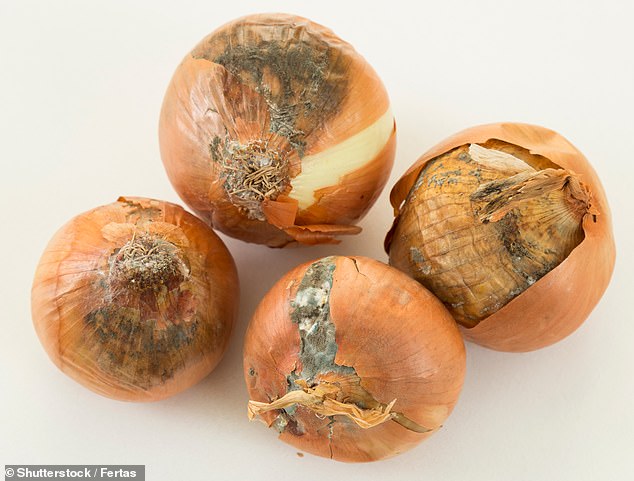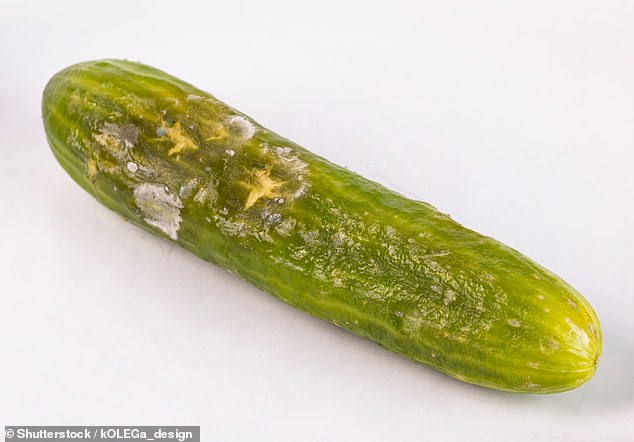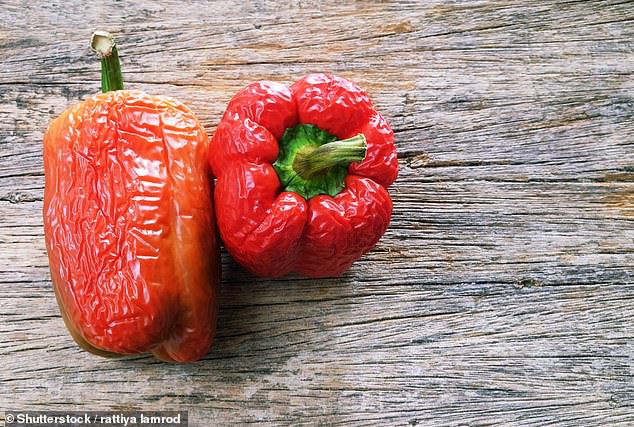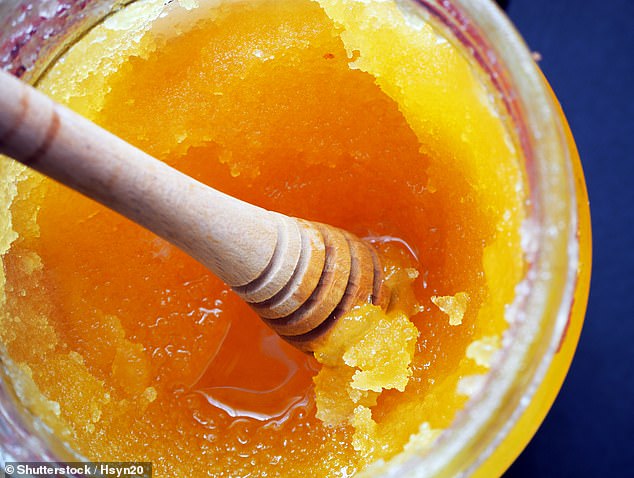Experts reveal unsuspecting foods you should never keep in the fridge or risk horrific poisoning
Even the most health-conscious people are likely keeping potentially toxic items in your refrigerator, experts warn.
Many know the dangers of storing canned goods, raw meat and fish in their unsealed form, but there are some unsuspecting items that can cause health problems.
Food scientists highly recommend keeping ginger, garlic, onions, cucumbers and colorful peppers on the counter.
Keeping that food in the refrigerator encourages mold growth and changes the texture from crispy and fresh to limp and rubbery.
The type of mold that can grow on some refrigerated foods is highly toxic.
Black mold can develop on onions and garlic that have been left in the refrigerator, potentially leading to kidney damage, lung infections, fungal ear infections and allergic reactions.
Ginger, meanwhile, can cause faint spots of Penicillium brevicompactum to develop. If the spores are inhaled, they can cause breathing problems.
If eaten, they can suppress the immune system, cause gastrointestinal upset and possibly cause liver toxicity.
Food scientists highly recommend keeping ginger, garlic, onions, cucumbers and colorful peppers on the counter. Keeping these items in the refrigerator can promote mold growth and change the texture from crunchy and fresh to soft and rubbery

Alliums, including garlic and onions, do not require refrigeration if they are kept in a cool, dry place with temperatures no higher than about 65 degrees. Onions can form black mold, which worsens asthma
Garlic & Onions
Alliums — the group to which garlic and onions belong — do not need to be refrigerated if they are kept in a cool, dry place, no warmer than about 65 degrees.
However, that’s only if they haven’t been peeled or sliced. Once they have been, food scientists recommend storing them in an airtight container in the refrigerator.
The cold, moist environment in a refrigerator converts the starches in alliums into sugars, causing them to become soft and soggy more quickly.
Dr. Margarethe Cooper, an expert in food safety and microbiology at the University of Arizona, said: ‘If stored in a cool, dry and well-ventilated area of your home, whole onions can keep for three months or even six months, provided they are dry and firm, with their skins intact and not sprouting.’
She added that they should be removed from the bags: ‘Leaving whole onions in a grocery bag without air circulation shortens shelf life by retaining moisture and encouraging the growth of spoilage microbes, such as mold.
‘A high moisture content can also cause onions to germinate. If the bag you purchased or stored the onions in at the store is airtight, place them in a mesh bag or container that allows air circulation.”
Refrigerated garlic can also sprout green stems after a few days, drastically shortening its shelf life. It can also become bitter, changing the taste of your favorite recipes, although the health risks are minimal.
Ginger

Whole, unpeeled ginger can last for weeks if stored in a cool, dry place. Excess moisture can promote the growth of mold or bacteria, leading to faster spoilage
Cold, damp conditions can cause unpeeled ginger to become rubbery and even moldy over time.
The cold can also dull ginger’s spicy, sharp taste, affecting the food it is prepared with.
Whole unpeeled ginger will keep for weeks in a cool, dry place. Too much moisture can accelerate the growth of mold or bacteria and promote faster spoilage.
Mold spores on ginger can cause sneezing, congestion, rash, or worsening asthma if inhaled.
Some molds can cause nausea and other gastrointestinal problems, liver and kidney damage and suppression of the immune system when ingested.
Mold produces mycotoxins such as aflatoxins and ochratoxin A, which according to the World Health Organization are ‘among the most toxic mycotoxins’.
According to the WHO, the most notable effect of Ochratoxin A is “kidney damage, but the toxin may also have effects on fetal development and the immune system.”
Cucumber

Cucumbers are sensitive to cold, damp conditions and can suffer from ‘cold injury’, resulting in soft spots and a watery texture that accelerates rotting
Cucumbers are sensitive to cold, damp environments and are prone to developing “chilling wounds”: soft spots and a watery texture that accelerates rotting.
Their flavor is best preserved by storing them on the counter at room temperature, although their shelf life is only a few days.
Refrigeration can speed up the spoilage of cucumbers, especially if they are stored in an airtight container, where condensation can form.
The moist environment is ideal for mold growth, especially if the cucumbers are already on the softer side.
Harmful bacteria such as salmonella and E. coli can multiply on a rotting cucumber.
Cucumbers are also sensitive to the ethylene gas released by ripening fruits, such as apples, bananas, pears, kiwis and tomatoes. This can accelerate the rotting of cukes stored nearby.
But if you insist on refrigerating your cucumbers, limit this to a maximum of three days and eat them as soon as possible.
Colorful peppers

The cold, moist conditions in a refrigerator cause peppers to become soft and watery
Colorful peppers lose their crispness in the refrigerator because they destroy their cell structure.
The cold, damp environment of a refrigerator causes them to turn into a soft, watery mess.
Unless they have been cut, refrigeration is not necessary. They should be stored in a cool, dry place.
Maddy Rotman, head of sustainability at Imperfect Foods, said: ‘Moisture is the key word here, because too much moisture can cause peppers to lose their crispiness.
“Try a pantry or a closet shelf.”
Honorable mentions

While the instinct may be to put an opened jar of honey in the refrigerator, cold honey can crystallize and solidify

To prevent white, spotty spots on your chocolate, store it out of the refrigerator. This “bloom” occurs when moisture dissolves the sugar, leaving a grainy white residue as it evaporates
Like peppers, tomatoes can be ruined by refrigeration. However, the best tomatoes, which have already been sliced, retain their flavor best at room temperature.
Honey can also be left on the counter. Although the instinct may be to put an opened jar in the refrigerator, cold honey can crystallize and solidify.
Berries are also best stored out of the refrigerator.
They spoil more quickly in cold, damp conditions, so a cool, dry alternative is best.
And if you prefer the chocolate without white, spotty spots on the surface, store it out of the refrigerator.
These white ‘flowers’ are the result of moisture forming on the surface of the chocolate and the sugar dissolving. When the water evaporates, it leaves behind a grainy, white residue.
Chocolate with flowers on the surface is safe to eat, but the texture becomes grainy and waxy.
